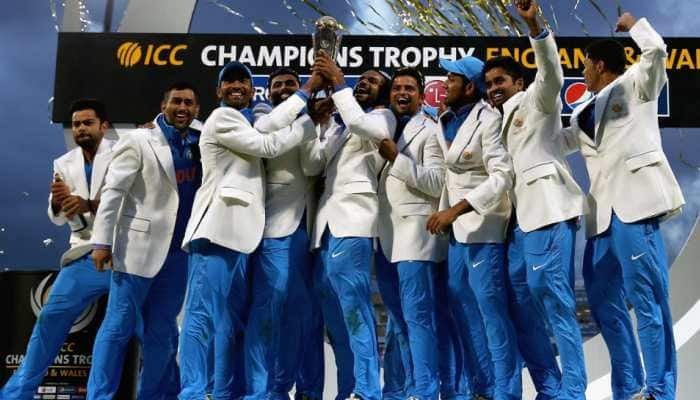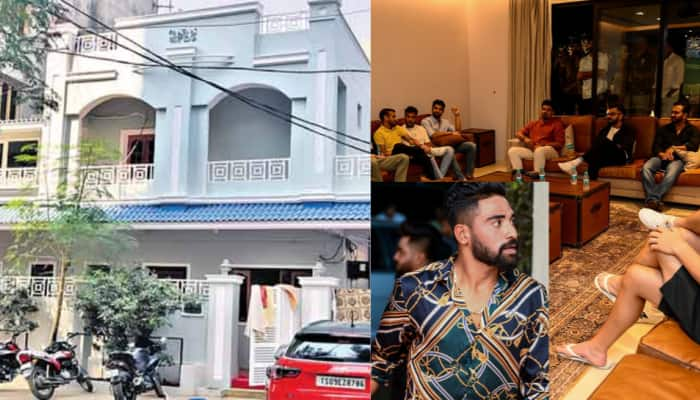'I speak HINDI with a lot of SANKOCH', says FM Nirmala Sitharaman
Union Finance Minister Nirmala Sitharaman on Thursday said that she finds it difficult to interact with Hindi audiences. She said this during an event organised by the Hindi Vivek Magazine in Mumbai.
- FM Nirmala Sitharaman has said she is uncomfortable speaking to a Hindi audience
- 'I speak Hindi with a lot of sankoch', the FM said
- The FM said this during an event organised by the Hindi Vivek Magazine
Trending Photos
)
Mumbai: Union Finance Minister Nirmala Sitharaman on Thursday said speaking Hindi gives her "shivers" and she speaks the language with hesitation. Speaking at an event organised by the Hindi Vivek Magazine, Sitharaman referred to a previous speaker's announcement that her speech will be in Hindi.
"Addressing an audience in Hindi gives me shivers," a candid Sitharaman said, explaining the circumstances that have led to this condition. Sitharaman said she was born and attended college in Tamil Nadu which was in the midst of agitation against Hindi and also witnessed violent protests against Hindi.
Students opting for either Hindi or Sanskrit as the second language, even those who stood on merit lists, did not get scholarships given by the state government because of their choices of languages, the Union Cabinet minister claimed.
Sitharaman said while it is difficult for a person to learn a new language after attaining adulthood, she could pick up her husband's mother tongue Telugu but could not take up Hindi may be due to past happenings.
"I speak Hindi with a lot of 'sankoch' (hesitation)," she said, admitting that the fluency with which she can speak is affected. The finance minister, however, continued speaking in Hindi and finished the entire speech which lasted over 35 minutes in Hindi.
Sitharaman said India could have achieved the position as the fifth biggest economy in the world earlier itself, but for the imported philosophy of socialism which depended on centralised planning.
She termed the 1991 economic reforms undertaken by the then Congress government as "aadhe-adhure reforms" (half-baked reforms), where the economy was not opened in the right way but as per the strictures imposed by the IMF.
No progress happened till the BJP's Atal Bihari Vajpayee took on the PMship and his focus on infrastructure building, roads and mobile telephony helped us a lot. Ten more years were lost after the corrupt UPA government came to power, where the focus was making personal gains and the country's interests were left behind, she claimed.
UPA regime left the economy in the mess and India became part of the fragile five, she said. The other economies part of the fragile five were--Turkey, Brazil, South Africa and Indonesia.
After his ascent to the PM's post, Narendra Modi initiated fundamental path-breaking reforms which also include the direct benefit transfer scheme that has ensured transparency in public delivery without leakages, Sitharaman said, adding that benefits of up to Rs 2 lakh crore have occurred as a result of the scheme.
The policy decisions have also laid the foundations for the emergence of a big lender like SBI which can serve the credit needs of the economy quickly, she said. The Modi regime has also taken the right decisions to be away from businesses where the government should not be, Sitharaman said, pointing out that Air India was facing losses of Rs 20 crore per day till it was privatised.
In addition, she said, the government also took some tough decisions such as abrogating provisions of Article 370 and Article 35A. On August 5, 2019, the Centre revoked the special status given to Jammu and Kashmir under Article 370 of the Constitution. The erstwhile state was also bifurcated into two Union Territories, Jammu and Kashmir, and Ladakh.
She further said that 'Jai Jawan, Jai Kisan, Jai Vigyan, Jai Anushandhan' and 'Sabka Saath, Sabka Vikas, Sabka Vishwas and Sabka Prayas' are going to be mantra for the next 25 years and this spirit would make India a developed economy by 2047.
Stay informed on all the latest news, real-time breaking news updates, and follow all the important headlines in india news and world News on Zee News.
Live Tv







)
)
)
)
)
)
)
)
)
)
